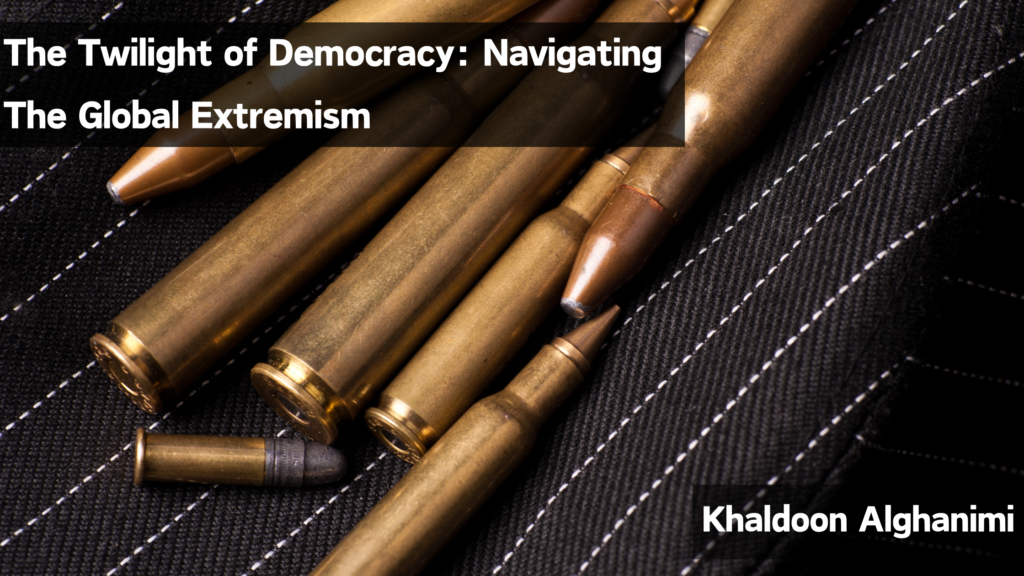In an era where information moves at the speed of light and societies evolve rapidly, the resurgence of extremist ideologies—both political and religious—poses a significant threat to the foundational principles of democracy, freedom, and peace. This article, “Shadows Over the Globe: The Resurgence of Extremism,” seeks to illuminate the dark corridors of these movements, drawing parallels between the present rise of right-wing movements around the world and the historic periods that witnessed the regression of human civilization into the shadows of intolerance and suppression, reminiscent of the Dark Ages.
The aim is not to provoke fear but to inform, educate, and foster a dialogue that transcends political and religious divides. It is an acknowledgment of the complex, interconnected world we live in, where the rise of extremism in any form cannot be seen in isolation. The resurgence of right-wing movements globally, and the persistent threat posed by Islamic extremist groups like ISIS, Al-Qaeda, Hamas, Hezbollah, and many more represent a multifaceted challenge to global security, human rights, and the very fabric of diverse societies.
This article endeavors to provide a nuanced exploration of these movements, tracing their origins, ideologies, and impacts. It is a call to understand the underlying causes that fuel extremism and to confront these challenges with knowledge, resilience, and a commitment to the values that unite us.
I approach this topic with the utmost respect for the sensitivity of the issues discussed and the diverse perspectives of those who may engage with this work. It is a topic fraught with controversy, but silence and ignorance offer no refuge. Examining these shadows, I seek not only to understand the present but to illuminate paths toward a more hopeful, inclusive future.
As we embark on this journey together, let us do so with open minds and a shared dedication to a world where dialogue triumphs over division, and unity prevails over the forces that seek to tear us asunder. This article is an invitation to reflect, to learn, and to engage in the crucial conversations that will shape our collective future.
The Rise of Right-Wing Movements Globally
The Resurgence Defined
Right-wing movements, characterized by their emphasis on nationalist, authoritarian, and often xenophobic ideologies, have seen a significant resurgence in various parts of the world. This phenomenon is not confined to any single geographic location but is a global occurrence, manifesting in diverse societies with unique historical and cultural contexts. These movements often advocate for a return to traditional values, stricter immigration controls, and policies that prioritize the interests of the native population over those perceived as outsiders.
Historical Context
To understand the rise of contemporary right-wing movements, it is essential to look at the historical backdrop against which these ideologies have gained momentum. The 21st century has been marked by rapid globalization, technological advancements, and significant shifts in economic power dynamics. While these changes have brought about unprecedented levels of wealth and interconnectivity, they have also led to feelings of disenfranchisement among certain segments of the population. Economic uncertainty, cultural shifts, and a sense of lost national identity have become fertile ground for right-wing ideologies to take root.
Global Patterns and Local Manifestations
The global rise of right-wing movements is not a monolith; each country’s movement has its nuances, driven by local conditions and historical factors. In Europe, for example, the influx of refugees and economic instability have played significant roles in the resurgence of nationalist parties. In the United States, the rise of right-wing movements has been linked to economic grievances, cultural changes, and a reaction against the perceived failures of liberal policies. In Asia, right-wing nationalism often intertwines with religious and ethnic identities, shaping policies and public sentiment.
Case Studies
– Europe:
A- The National Rally (Formerly National Front), France: Once a fringe party, the National Rally, led by Marine Le Pen, has become a major player in French politics. Its rise mirrors growing concerns over immigration, national identity, and sovereignty within the EU. Capitalizing on economic frustrations and terrorist attacks, the National Rally advocates for strict immigration controls, anti-EU policies, and the preservation of French culture. Its significant performance in recent elections underscores a broader shift toward right-wing populism in Europe, challenging traditional political dynamics and policies, especially concerning multiculturalism and European integration.
B- Alternative for Germany (AfD): Founded in 2013, the AfD initially focused on euro-skepticism and the financial crisis but quickly shifted its rhetoric towards immigration, Islam, and national identity, especially following the migrant crisis of 2015. The AfD’s ascent to the German Bundestag in 2017 marked a significant moment in German post-war politics, breaking the taboo against hard-right parties in the parliament. The party’s messaging, which includes criticism of the EU, anti-immigrant sentiment, and skepticism of climate change policies, has resonated with a substantial segment of the German electorate, reflecting deeper societal divisions and anxieties.
– United States:
A- The Trump Phenomenon: Donald Trump’s election as President in 2016 was a watershed moment for right-wing movements in the U.S. His campaign, which emphasized nationalism, anti-globalization, and a hard stance on immigration, tapped into a vein of discontent within the American electorate. Throughout his presidency, Trump’s policies, such as the travel ban on citizens from several predominantly Muslim countries and the building of a border wall with Mexico, along with his rhetoric, significantly influenced the national conversation on identity, race, and the role of the United States in the world. The Trump phenomenon highlighted the polarization within American society and the appeal of populist narratives to a substantial portion of the population.
– Brazil:
A- Jair Bolsonaro: Jair Bolsonaro’s election as President of Brazil in 2018 represented a dramatic shift in the country’s political landscape. Often referred to as the “Trump of the Tropics,” Bolsonaro’s campaign capitalized on widespread dissatisfaction with corruption, crime, and economic malaise. His presidency has been marked by controversial stances on environmental regulations, human rights, and COVID-19, resonating with conservative and anti-establishment sentiments. Bolsonaro’s support for traditional family values, skepticism of climate change, and tough-on-crime rhetoric reflect the broader appeal of right-wing ideologies in response to perceived threats to national identity and sovereignty.
Driving Factors
The resurgence of right-wing movements across the globe can be traced back to a confluence of social, economic, and political factors that have unsettled traditional ways of life and sparked fears about the future. Each of these driving factors not only contributes to the appeal of right-wing ideologies but also complicates the challenge of addressing the root causes of their rise.
– Economic Anxiety: The advent of globalization and rapid technological advancements have dramatically transformed economies around the world. While these changes have brought about significant benefits, including increased efficiency and new markets, they have also led to job displacement and economic insecurity for significant segments of the population. Industries that once formed the backbone of national economies have seen jobs outsourced to lower-cost countries or replaced by automation, leaving communities struggling to adapt.
Right-wing movements tap into this economic anxiety, positioning themselves as champions of the “forgotten” working class. They advocate for protectionist economic policies, promising to restore jobs and industries lost to foreign competition or technological change. This message resonates deeply with individuals feeling left behind by the global economy, fueling support for right-wing ideologies.
– Cultural Changes: Societies worldwide are experiencing rapid social changes, including shifts in family structures, gender roles, and lifestyle choices, driven by greater acceptance of diversity and individualism. While many view these changes positively, they have also provoked a sense of dislocation among others who perceive these developments as a threat to traditional values and norms.
Right-wing movements exploit these fears, promoting a narrative that blames liberal or progressive policies for undermining societal cohesion and moral standards. They promise a return to an idealized past, where traditional values are revered, and social change is resisted, appealing to those who feel alienated by the pace of cultural transformation.
– Immigration: The increase in global migration has brought issues of national identity, cultural integration, and resource allocation to the forefront of political discourse. Right-wing movements have been particularly adept at framing immigration as a threat to national security, economic stability, and cultural identity, suggesting that immigrants are competitors for scarce jobs and resources, or even potential sources of criminality and terrorism.
This portrayal of immigration as a crisis to be managed or a threat to be countered has proven effective in rallying support for right-wing parties and policies that advocate for stricter immigration controls and the prioritization of native-born citizens’ needs and interests.
– Security Concerns: In the wake of terrorist attacks and rising crime rates in some areas, security has become a paramount concern for many citizens. Right-wing movements seize on these fears, portraying themselves as the only ones willing to take the hardline measures necessary to protect the nation. They advocate for increased surveillance, law enforcement powers, and military spending, often at the expense of civil liberties and human rights, under the guise of national security.
By presenting themselves as the defenders of safety and order, right-wing movements gain the support of those who feel threatened by the perceived rise in crime and terrorism, further entrenching the belief that authoritarian measures are justified in the name of security.
The Impact on Democracy and Society
The ascendancy of right-wing movements across the globe represents a significant challenge to the foundations of democratic societies. These movements, while varied in their specific ideologies and policies, often share a common disposition towards nationalism, skepticism of globalization, and an aversion to immigration and multiculturalism. Their impact on democracy and society is profound, raising critical concerns about the future of pluralistic values and the cohesion of increasingly diverse communities.
– Erosion of Democratic Norms: Right-wing movements frequently express disdain for what they perceive as the “elite” political establishment, accusing it of being out of touch with the “real” citizens. While such critiques can be a healthy aspect of democratic discourse, they sometimes cross into undermining trust in democratic institutions themselves. Claims of rigged elections, deep state conspiracies, and media bias can erode public confidence in the pillars of democracy, including the electoral process, the judiciary, and the free press. When these institutions are weakened, democracy itself becomes vulnerable to authoritarian tendencies, where power is concentrated, and accountability is diminished.
– Challenges to Pluralism and Tolerance: A core tenet of democratic societies is the principle of pluralism: the idea that a range of different cultural, religious, and political perspectives can coexist and enrich a community. Right-wing movements, however, often promote a more homogenous vision of society, where divergent views, particularly those pertaining to immigration and multiculturalism, are viewed with suspicion or outright hostility. This stance poses a direct challenge to the inclusive ethos of pluralistic democracies, threatening to replace tolerance and mutual respect with xenophobia and sectarianism.
– Polarization and Radicalization: The rhetoric employed by some right-wing movements can contribute to a deepening of social and political divides. By framing issues in zero-sum terms—where gains for one group are perceived as losses for another—these movements can exacerbate tensions between different community segments. This environment of heightened polarization is fertile ground for radicalization, as individuals retreat into echo chambers that reinforce their views and demonize the opposition. Such polarization makes it increasingly difficult to find common ground on which to address societal challenges, paralyzing political discourse and governance.
– Impact on Social Cohesion: The social fabric of communities is strained as the rise of right-wing movements fosters divisions. Incidents of hate speech, discrimination, and violence against minority groups can increase, fueling fear and resentment. This not only affects the immediate victims but also undermines the sense of belonging and security that is essential for vibrant, cohesive societies. The breakdown in social cohesion can lead to isolated communities, where mistrust and misunderstanding replace dialogue and collaboration, weakening the societal bonds that hold diverse nations together.



